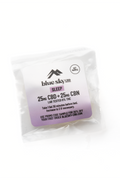8 Tips for healthy sleep by Dr. Eric Dorninger, ND.
1. Quality sleep is known as restorative sleep, and is essential for releasing restorative growth, hormones that decrease inflammation, pain, and rejuvenate the cells of the body. Moreover, quality sleep is correlated with less cancer, incidence and reduction in heart attack and stroke. Quality sleep is also known as beauty sleep because it helps keep our tissues, young and functional.
2. Lousy sleep is correlated with increased risk of heart, attack and stroke, increased cancer rates, and increase in virtually every inflammatory disease (headaches, brain fog, arthritis and more).
3. Ideally adults get 6-9 hours of sleep a night with seasonal fluctuations. In general, an hour, more in the winter than in the summer. Research shows when approaching five hours or less of sleep rates of heart attack dramatically go up. We’ve all experienced our brain function and mood responding best to a good night's sleep.
4. The two most common issues with quality of sleep are problems with oxygen and or problems with fuel (glucose or ketones if on a ketogenic diet). When having lousy sleep, the first thing your doctor should evaluate is an overnight oximeter that tells us if your oxygen levels are staying above 90%. When oxygen levels fall, the brain panics and wakes up spikes stress hormones, and gets kicked out of restorative rejuvenating, growth, hormones. Sleep apnea is rampant in 55 and older, but often not diagnosed because many doctors were taught to look for morbidly obese patients as the only ones with potential for Apnea. Unfortunately, 1/3 of all apnea patients are thin, apnea goes up with altitude (higher rates in Denver than in Florida), and post menopausal women have higher rates of apnea. Moreover, you can snore and not have apnea, and you cannot snore, and have very concerning apnea.
Similar to oxygen drops in blood sugar (hypoglycemia) or elevated blood sugar from diabetes can cause disrupted, lousy sleep. Working with a doctor that understands nutrition, or a qualified nutritionist can dramatically help with stabilizing fuel to your brain throughout the night.
Traditional ideas of healthy communication, journaling, stressful thoughts to get them off your mind, blackout shades, and not watching stressful TV shows are all some of the basics of good sleep hygiene. Some people do very well with weighted blankets.
40 plus adults, have a natural decline in melatonin and 3 to 10 mg of melatonin 30 minutes before desired bedtime in those who are having trouble falling asleep, taking at bedtime for those with difficulty staying asleep, can be very helpful.
Traditionally, anti-inflammatories like Advil and Tylenol help adults to sleep by calming down. Inflammation allows sleep cycle hormones to release better. Unfortunately, long-term use of these over-the-counter medicines can drive kidney issues, liver, concerns, and intestinal lining concerns.
My favorite anti-inflammatory for seniors that sets up a good nights sleep, but does not come with these organ concerns is pure Cannabidiol for some and CBD/CBN (personal favorite is Blue Sky CBD) combination for others.
Nevertheless, if you forget to ensure your brain has steady oxygen, and said, if you owe for the night, your sleep problems will perpetuate.
5. Inadequate quality sleep can literally contribute to every illness known to man. In my 20 years of clinical practice, I have seen two major panaceas: a good night's sleep and moderate exercise, and these two play off each other. That is daily movement helps set up a good night sleep and a good night sleep sets up the desire to want to move.
6. A 2016 UCLA study shows that sleep resulted in deterioration of the cells, growth, and division cycle. This is one of many studies showing poor quality sleep, triggers, inflammation, and tissue destruction.
7. Reach out to your primary care doc when figuring out sleep issues and let them know you would like to find the underlying causes of your sleep, and avoid taking a “drug for symptom” approach to your sleep issues. Advocate to get overnight oximetry and consider a constant glucose monitor (CGM) to ensure you are not missing the brain's two most important ingredients for a good night's sleep, steady, fuel, and steady oxygen.
8. Sometimes acupuncture can be very helpful for Sleep as well as safe anti-inflammatories like pure CBD isolate, Apigenin, L-Theanine and /or Magnesium.

